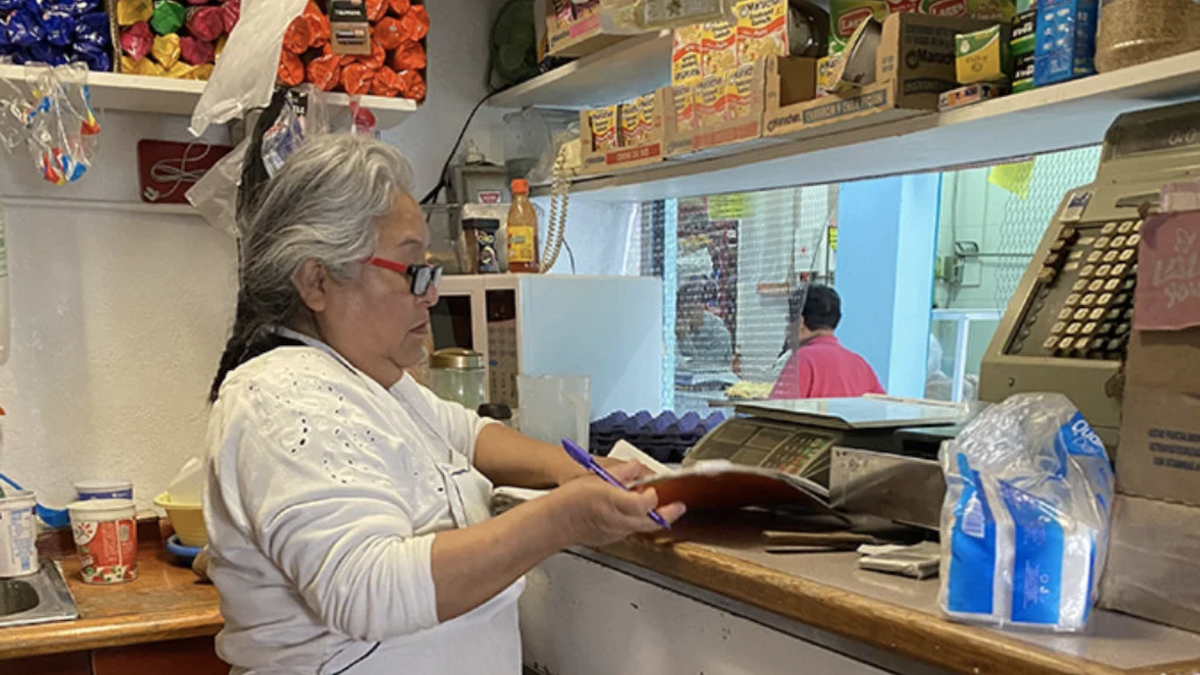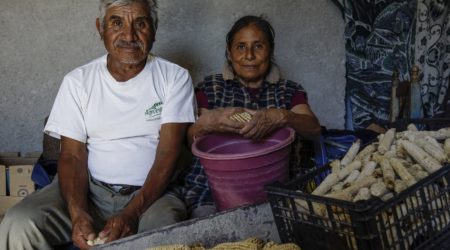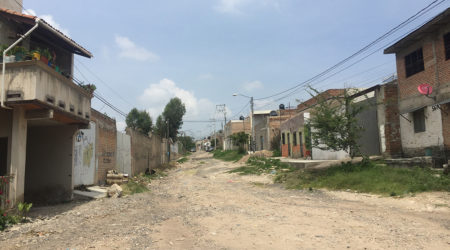Beyond financial inclusion: Measuring and improving financial health outcomes in México

Measuring financial health is a challenge. Although there is industry consensus on the theme of financial health, the methodologies for monitoring and measuring it are new. They range from self-reported assessments related to account usage, balances, experience, and behaviors, to more “objective” measures, which are limited by the level of access to low-income people’s full financial lives. To date, there is no consensus among experts about the right way to measure it. In Mexico, there is now an opportunity to leverage our shared understanding of financial health to create a measurement tool that can make financial health more concrete and operational. Ultimately, the aim is to ensure better products and services, and improvement in low-income people’s financial lives.
FinnSalud is a BFA Global program funded by MetLife Foundation that seeks to transform financial health from a conceptual framework to a measurable reality in Mexico. Our work on measurement is designed to sharpen the financial inclusion industry’s ultimate goal: to improve Mexican people’s financial health. We aim to do this by developing an efficient and affordable measurement tool that financial institutions, non-profits, and others in Mexico can use to measure and enhance their customers’ financial health, through improved product offerings.
The financial health movement in policy and philanthropy shares several common threads despite differences in frameworks and surveys. These threads suggest common channels by which financial inclusion can improve consumers’ wellbeing that include: preparing for and coping with shocks (resilience), managing daily financial lives and meeting obligations, avoiding debt traps, smoothing consumption, investing in one’s long-term goals, providing for one’s family, sustaining a standard of living in old age, and contributing to happiness by minimizing stress from financial worries. For BFA Global, to be financially healthy is to manage your finances in a way that enables you to cover daily expenses, achieve life goals, build resilience against shocks, and seize opportunities for economic growth, all while preserving sufficient agency.
Building on this framework, FinnSalud will rely on subjective, client-reported financial health measures, supplemented with more objective customers’ transactional data with a subset of people using formal financial services, to validate the reliability of the subjective measures. We will then stress-test the subjective measures to produce a first version of a financial health index that can provide a quick and low-cost measure of an individual’s financial condition in the present day and serve as a proxy for future outcomes.
Our financial health framework
The financial health framework we seek to operationalize comprises four interlocking dimensions that are distinct from one another and rely on data inputs related to consumer finances. We refer to this framework as DORA, the acronym formed by the four dimensions: Day-to-day management, Opportunities, Resilience, and Agency.
Low- and moderate-income customers can improve their ability to meet challenges and achieve goals through the effective use of well-designed financial services. But to know whether these services are enhancing people’s financial health, we need to have a way to measure it and track it. As the saying goes, “you can’t improve what you don’t measure.”
Developing the financial health measurement tool
We want financial health to be a lens for product design, strategy, and customer relations that will inform financial institutions’ relationships with their customers. To develop and test the tool, we will start with a baseline study in partnership with selected financial services providers that serve low-and moderate-income populations.
We intend to characterize our financial health measurement tool into a single financial health index to enable efficient and useful measurement. The tool will produce a financial health score that will provide insights into the specific conditions leading to consumer financial wellbeing. Since financial institutions hold accounts on behalf of individuals – not households – our unit of analysis for the development of the tool will be the individual.
The baseline survey
We will conduct the baseline study with FinnSalud’s financial cooperative partners in Mexico: Cooperativa Acreimex, operating out of Oaxaca state, and Caja Popular Atemajac, operating out of Jalisco state. Their missions are to promote economic and social improvements and the welfare of their joint ~250,000 low- to moderate-income members and their enterprises. Since a rapid appraisal tool is a critical component of the program’s vision for allowing financial providers to assess their customers’ financial health, calibrating the tool is the baseline study’s primary purpose.
Our sample will comprise 850 members of each cooperative, who will participate in 20-30-minute phone interviews. We will draw a stratified random sample from their customer database using population proportional to size (PPS) sample allocation, segmenting according to age, gender, and urbanicity.
In the case of Acreimex, we have launched a distinct support initiative to design and roll out a recovery loan program offered to members whose businesses can productively use the funding to recover from the crisis. We will evaluate this program on its sustainability from the perspective of the cooperative, as well as the impact on participants’ earnings and employment. The goal of the loans program is to foster economic recovery on a feasible and achievable scale for financial cooperatives. From a financial health perspective, the goal is to calibrate the measurement tool with an implementing partner, even with a small sample of loan recipients. We will conduct further measurement exercises after product roll-out to determine recipients’ financial health outcomes, using the scorecard developed for the members of that cooperative.
While the study’s purpose is to provide a baseline set of financial health indicators, we recognize that it has some limitations. Since we have calibrated this first iteration to a sample of people who belong to financial cooperatives, we know this population is systematically different from Mexico’s national population in important ways. First, this population has financial access, which distinguishes them from the 50% who don’t. Secondly, they share economic traits specific to the states and localities where they reside, so we know that this population won’t be nationally representative in all aspects. Nevertheless, we hope to demonstrate that the scorecard approach can produce a useful and feasible measure of financial health and show whether the scorecard meaningfully correlates to specific financial behaviors that advance financial health, such as budgeting, planning for the future, and preparing for shocks. In future iterations, we will expand the sample, slightly revise the question sets as needed, and update the point values to reflect new learnings.
The financial health index & score
We are designing the financial health measurement tool to gather and visualize information from end-users’ financial health status. The tool will integrate findings from multiple sources on end-users, including in-depth and light-touch digital surveys, demographic and transactional data analysis to learn about end-users’ financial practices, beliefs, and behaviors. It will allow providers to measure a generic customer’s financial health and also that of key segments, such as low-income laborers and micro-entrepreneurs. It will estimate one or more financial health metrics that both financial institutions and end-users can visualize, depending on the provider’s intent.
Our approach will produce a financial health index as the critical component of the program’s vision for allowing financial providers to quickly and easily assess their customers’ financial health. Together, baseline survey responses and administrative data (e.g., household size and structure, account ownership, and saving and credit behavior) will give us the best available description of respondents’ financial health. This dataset will enable us to create a scoring approach for a light-touch, short-format, digital survey that can predict financial health outcomes.
The resulting first version of a composite financial health score will provide insights into the specific conditions leading to consumer financial wellbeing. The score will inform providers on aspects of their customers’ financial health they may want to enhance and can also be provided to end-users in a way that can elicit positive action.
Next steps
Throughout this exercise, we will maintain close collaboration with relevant stakeholders, including our donor, financial services providers, non-profits, policymakers, researchers, and others, to ensure widespread applicability and relevance of the measurement instrument.
In 2021 we intend to deploy and test the tool with an additional 1-2 cooperatives, MFIs, or inclusive fintech startups. We will run experiments with them, collect lessons to perfect the tool, and adapt our institutional partners’ products and services as needed, aiming to improve their customers’ financial health. We expect our partners to adopt the tool into their business processes for product design and customer outreach. Subsequent work with yet another 5-8 institutions, as “replicators,” will expand usage and help test the tool further in different scenarios to set the stage for wide and easy adoption by other players.
We anticipate that the information provided by the measurement tool will enable our partners to roll out products and services that allow better targeting of financial offerings to their customers’ specific needs, resulting in better resource allocation and better financial outcomes for both.
We embark on this initiative hopeful that we will achieve our objective, well aware that we might need to adapt and adjust to always-changing realities, more so in a COVID-19 era. Please stay tuned for a future blog in which we’ll share our learnings and outcomes from this process.


